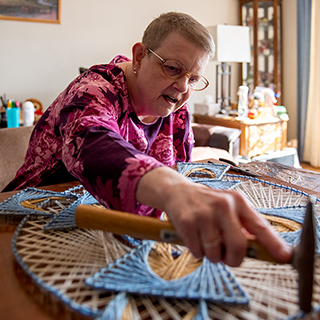Kidney Transplant
Virtua’s kidney transplant program is devoted to shortening your time on the waiting list and improving your health.

Virtua is South Jersey’s only center for organ transplantation, and one of the most experienced programs in the state, with advanced capabilities to treat individuals with the most complex medical needs. Our compassionate staff provides personalized care throughout your kidney transplant journey.
Types of Kidney Transplants at Virtua
A kidney transplant is a life-changing procedure if your kidneys can no longer rid your body of excess fluid and waste.
At Virtua, we provide the following types of kidney transplants:
- Living donor kidney transplants from individuals willing to donate a kidney as a gesture of love or selflessness. Living donation greatly reduces your time spent on the transplant waiting list and improves your long-term survival
- Deceased donor kidney transplants from individuals who have chosen (or their family has consented) to donate their organs after death for the betterment of others
- Simultaneous kidney-pancreas transplants, using organs from the same deceased donor
- Pancreas after kidney transplants, two procedures that use a kidney from a living donor and later a pancreas from a deceased donor
- Simultaneous liver-kidney transplants, with organs coming from deceased donors
- Renal autotransplantation, in which a surgeon removes a kidney, fixes its vascular or ureter problems, and implants it back into the patient
Am I a Candidate for a Kidney Transplant?
The kidneys play an important role in your health, filtering your blood to remove waste, toxins, and excess fluid. They help to regulate your blood pressure, stimulate the production of red blood cells, and keep your bones healthy.
When your kidneys are unable to perform these functions, you may require dialysis, a treatment that uses a machine to remove fluid and waste from the blood. Dialysis may be performed several days a week at a center or at home.
Even before you require dialysis, your doctor may recommend a kidney transplant. If you meet the criteria for a kidney transplant, a multidisciplinary team will conduct a comprehensive evaluation.
At Virtua, you may be evaluated for a kidney transplant if you:
- Are in general good health with no preexisting conditions that may affect a successful outcome
- Have stage 4 or 5 chronic kidney disease (CKD)
- Require dialysis to remove waste products and excess fluid from your body, or soon will
- Have a body mass index (BMI) of 47 or less (with a goal of having a BMI of 40 at listing and 35 at surgery)
- Have adequate support essential to post-transplant care
- Have insurance that will pay for immunosuppressant medications
Virtua Kidney Transplant Specialists
At Virtua Advanced Transplant & Organ Health, you are cared for by a multidisciplinary team of specialists. Our experienced team provides compassionate, personalized care before, during, and after your transplant.
Kidney Transplant at Virtua
Because of the shortage of donor organs nationwide, the time to wait for a new kidney can be many years. In the South Jersey region, the wait time for a kidney transplant is usually more than four years.
We strive to shorten your time on the wait list through progressive organ procurement programs, including:
- Pursuit of living and deceased donor organs from greater distances
- Participation in paired exchange (where two or more kidney patients whose living donors aren’t compatible each receive a kidney from the other’s living donor through a matching system), chains (which involve multiple paired exchanges), and remote donor transplants (where an individual completes their evaluation and surgery at a nearby transplant center instead of traveling to the recipient’s hospital) through organizations such as the National Kidney Registry to obtain organs from across the country
- Participation in Donor Outreach for Veterans (DOVE), a New Jersey-based organization that matches veterans with living donors nationwide
- Safe transplantation of organs from donors with hepatitis C into recipients without the virus through pre- and postoperative medication
Advanced surgical capabilities
As part of our effort to shorten your time on the wait list, Virtua Advanced Transplant & Organ Health surgeons specialize in advanced surgical procedures that increase the availability of kidneys and the ability of people to receive them. This includes addressing complex vascular issues of the donor organ and patient, correcting abdominal abnormalities, and managing scarring from previous abdominal surgeries.
With you every step of the way
Throughout your transplant journey, you'll be in close contact with your Virtua nurse coordinator.
During your time on the transplant list, you'll undergo regular checkups, including blood tests. Discuss with your coordinator any major changes, including hospitalizations, medications, and insurance coverage updates.
If you have a living donor, the transplant team will work with you and your donor to schedule the surgery.
If you're on the wait list, the nurse coordinator will call you when a donor kidney becomes available. It's important that you remain available to receive phone calls and be ready to go to the hospital at all times.
What to Expect During Your Kidney Transplant Surgery
During your surgery, the new kidney is implanted through an incision in your lower abdomen. Your new kidney is attached to your bladder and blood vessels. In many cases, your existing kidneys are left in place. If you are also receiving a new pancreas (through a simultaneous kidney-pancreas transplant or a pancreas after kidney transplant), it will be attached to your small intestine or bladder and your blood vessels.
The surgery takes several hours to complete.
You'll remain in the hospital for an average of four to five days as you recover from surgery and as your new kidney reaches full function. You will begin receiving medication to help your body accept your new organ. You will need to take this medication for life.
What to Expect After Your Kidney Transplant Surgery
Following your transplant, your personal care team will include post-transplant nurse coordinators. The post-transplant team will meet with you in the hospital to talk about:
- Taking your daily organ anti-rejection medication, as well as any other prescribed medicines.
- Managing pain and fatigue in the days and weeks following your transplant.
- The importance of staying hydrated.
- Following activity restrictions. Generally, you can resume most activities within six to 12 weeks after surgery, but may need six months before returning to work and other normal activities.
- Continuing care with your primary care physician and other specialists.
After leaving the hospital, you will meet with the Virtua transplant team:
- Twice weekly in the first month
- Weekly in the second month
- Every other week in the third month
For the rest of the first year, monthly visits will alternate between your kidney specialist and the transplant team, although you may need more frequent checkups, depending on your health. During these visits, we will assess your health, review blood test results, and make any changes to your medications as needed.
Your nurse coordinator will outline your treatment plan after the first year.
Virtua Kidney Transplant Locations
All organ transplants are performed at Virtua Our Lady of Lourdes Hospital. And with medical offices across the region, transplant evaluations and appointments are never far from home.
The Virtua Difference for Kidney Transplant
Comprehensive care
We provide coordinated and comprehensive kidney, pancreas, and liver care at every stage of your condition. Virtua is the only provider of kidney, pancreas, and liver transplantation in South Jersey, with the expertise to treat the most complex medical needs.
Comprehensive care
We provide coordinated and comprehensive kidney, pancreas, and liver care at every stage of your condition. Virtua is the only provider of kidney, pancreas, and liver transplantation in South Jersey, with the expertise to treat the most complex medical needs.
National recognition
Virtua Advanced Transplant & Organ Health is certified by the United Network for Organ Sharing (UNOS) and is approved by the U.S. Centers for Medicare and Medicaid Services.
National recognition
Virtua Advanced Transplant & Organ Health is certified by the United Network for Organ Sharing (UNOS) and is approved by the U.S. Centers for Medicare and Medicaid Services.
Shortened wait times
Through remote kidney transplantation and other programs, we progressively work to shorten your time waiting for a new organ, so you can get back to living your fullest life.
Shortened wait times
Through remote kidney transplantation and other programs, we progressively work to shorten your time waiting for a new organ, so you can get back to living your fullest life.
Lifetime support
All organ transplant donors, recipients and their families are forever part of our family, with lifetime education and follow-up based on your individual needs. In honor of organ donors and recipients, the statue atop Virtua Our Lady of Lourdes Hospital is lit green following every transplant.
Lifetime support
All organ transplant donors, recipients and their families are forever part of our family, with lifetime education and follow-up based on your individual needs. In honor of organ donors and recipients, the statue atop Virtua Our Lady of Lourdes Hospital is lit green following every transplant.
Virtua Specialty Pharmacy
Being a transplant recipient at Virtua means that you have quicker, easier, and more reliable access to the specialty medications you need, when you need them. Our dedicated care coordination team at the Virtua Specialty Pharmacy is here to answer any of your questions, work with your insurance provider, and provide options for financial assistance.
Virtua Specialty Pharmacy
Being a transplant recipient at Virtua means that you have quicker, easier, and more reliable access to the specialty medications you need, when you need them. Our dedicated care coordination team at the Virtua Specialty Pharmacy is here to answer any of your questions, work with your insurance provider, and provide options for financial assistance.



